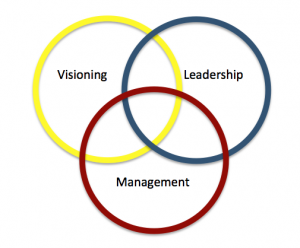by Charles Plant | Dec 20, 2013 | Leadership Development
 I’ve spent more time on Google this week checking out what people have to say about management versus leadership. I may be flogging a dead horse but I keep coming up with people who say that one of the most important aspects of leadership is coming up with a vision or as we shall now call it, Visioning.
I’ve spent more time on Google this week checking out what people have to say about management versus leadership. I may be flogging a dead horse but I keep coming up with people who say that one of the most important aspects of leadership is coming up with a vision or as we shall now call it, Visioning.
I certainly used to subscribe to that view and in fact I used to say that leadership was all about setting the vision, communicating that vision and motivating people around the vision. But that vision thing has got me wondering whether Visioning (you love that word don’t you?) is really part of leadership or is it something else.
If you accept my earlier premise that management is about logic, and leadership is about emotion then where does Visioning sit? If you look at it carefully, Visioning includes a logical component when it comes to examining markets and value propositions and figuring out strategic differentiation. That part of visioning is management. The inspiration part where we hold hands and imagine a better future for the staple industry (for example) is emotional.
I’m going to propose that there are really three dimensions to getting things done in an organizational context. Those things are Management, Leadership and Visioning.
- Management is the logical side and is all about process.
- Leadership is behavioural in nature and is about making an emotional connection.
- Visioning is about developing a description of a desired future state.
This construct solves the dilemma about nasty bosses who have great visions. This way we can stop arguing about whether Steve Jobs was a lousy or great leader. We can conclude that he was a great Visioner but a lousy leader.
by Charles Plant | Dec 19, 2013 | Leadership Development
If I’ve got it right about the definition of management versus leadership and management is all about logic, and leadership is about emotion then it begs the question, which is more important?
Another way of asking the same question is to ask whether you can be an effective manager without being a good leader or vice versa, can you be an effective leader without being a manager?
I think we can all agree that being both is best but if you had to choose one, which would it be?
When I started contemplating the writing of this blog, I thought I would come down on the side of a balanced approach but alas, I have not ended up there. I’m afraid to say that I’m coming down on the side of management. I am willing to be disagreed with but I thought back to “Bosses I have Known” and decided that it really didn’t matter if they were good leaders.
One boss I knew was a tyrant but a good manager. He got great results. Another one I knew was a great leader but bad manager and everyone was motivated but results were poor. So I came up with this chart. Someday it will be as famous as the Boston Consulting Group’s Cow/Star thingie so don’t forget, you saw it here first: Management versus Leadership.
 In the end, for a company, it’s all about the results and a bad leader who is a good manager can deliver results but a good leader who is a bad manager is unlikely to deliver.
In the end, for a company, it’s all about the results and a bad leader who is a good manager can deliver results but a good leader who is a bad manager is unlikely to deliver.
by Charles Plant | Dec 18, 2013 | Leadership Development
 I’ve struggled for a long time with coming up with a good definition of management versus leadership. It seems that people use the two words interchangeably. Others seem to have strong opinions about what each is. I’ve heard a number of CEOs say that they need better managers and not better leaders.
I’ve struggled for a long time with coming up with a good definition of management versus leadership. It seems that people use the two words interchangeably. Others seem to have strong opinions about what each is. I’ve heard a number of CEOs say that they need better managers and not better leaders.
In grappling with a way to distinguish between the two I’ve also been trying to find a way to describe what I do. I think I started out trying to help people improve their leadership capabilities but I’m now convinced that what I do is more oriented around improving management skills. the key is deciding how you define these two things.
So here it goes (until I come up with another definition.)
Management is a bunch of processes that are deployed to run an organization. These processes are about analyzing, planning, organizing, staffing, directing and controlling. This is how you clarify jobs, measure performance, problem solve, and reward people. This is the logical side of business.
Leadership on the other hand is about motivating and inspiring people. It is about making an emotional connection with an individual and thus is the emotional side of organizations.
There are a few disciplines that cross the two boundaries, setting a vision and communicating being two that come to mind immediately. These disciplines have both a logical, procedural component and an emotional one.
So I”m coming full circle in my thinking, having started with focussing on leadership and now thinking maybe that’s the wrong focus. After all, it’s hard to teach leadership behaviours to people but relatively easy to teach management processes. And from what I see, there is as much wrong with management as there is with leadership.
by Charles Plant | Dec 4, 2013 | Leadership Development
 I figured I should follow up last week’s posts about Office Politics with something about how to play the game. But that’s where I got stumped. I never really figured out how to play office politics so was having trouble figuring out how to advise my loyal readers on what to do.
I figured I should follow up last week’s posts about Office Politics with something about how to play the game. But that’s where I got stumped. I never really figured out how to play office politics so was having trouble figuring out how to advise my loyal readers on what to do.
As you might imagine I turned to Google to give me some good advice. Unfortunately I got a lot of smarmy, socially correct, well-meaning posts on the topic. OMG, people do take themselves so seriously. Well that wouldn’t work so I performed a multi-variant analysis using chi-squared techniques on behavior patterns of successful office politicians.
That’s when it hit me. I thought back to all the people I knew who were good at office politics. The one thing they had in common was that they were all giant suck-ups. Now in case you are unclear of what a suck-up is, please check out some marvelous definitions in the Urban Dictionary. (One great thing about the term is that is can be used as both a verb and a noun.)
I thought back to famous suck-ups I have known who made chummy with the boss, were always in her office, sought her out for special advice and overall, talked a very good game without ever producing anything. These were the people who won in office politics.
The people who lost were the quiet ones who just did their job, didn’t draw attention to themselves, didn’t seek special favor and who were just all-round competent. In the end if you’re one of these people, you know who you are because the suck-ups really piss you off.
So if you want to get better at office politics, time to change your behavior and start sucking up.
by Charles Plant | Nov 28, 2013 | Leadership Development
 Office politics and turf wars seem to hit a nerve with people. The thing is that it’s all so unnecessary and can be easily eliminated if companies realized what a toll it’s having on the organization. Here’s what I think is causing office politics in the first place.
Office politics and turf wars seem to hit a nerve with people. The thing is that it’s all so unnecessary and can be easily eliminated if companies realized what a toll it’s having on the organization. Here’s what I think is causing office politics in the first place.
- Executives are creating their strategic plans but not properly communicating those plans down the line.
- Thus workers are confused as to what exactly they should be doing.
- So they make up an answer and proceed to do whatever they think is best.
- Which leads them to compete with people who also think that they have responsibility for the same thing.
- So they compete for resources, budget, attention, whatever is necessary.
- And they frequently end up duplicating efforts.
- Wasting resources,
- And pissing off customers who retreat confused.
The poor schlub who sits at the bottom of the chain spends his life (notice that I said ‘his’ because schlubs are never female) battling turf wars. The thing about turf wars is that they are impossible to win. You’ll always be fighting a rear-guard action against the enemy trying to encroach upon your turf.
Of course I turned to Sun Tzu to hear what he had to say about turf wars: “The good fighters of old first put themselves beyond the possibility of defeat, and then waited for an opportunity of defeating the enemy.”
Good old Sun Tzu. Always something pithy and apropos to quote so the writer can seem erudite, well read, and intelligent.
 I’ve spent more time on Google this week checking out what people have to say about management versus leadership. I may be flogging a dead horse but I keep coming up with people who say that one of the most important aspects of leadership is coming up with a vision or as we shall now call it, Visioning.
I’ve spent more time on Google this week checking out what people have to say about management versus leadership. I may be flogging a dead horse but I keep coming up with people who say that one of the most important aspects of leadership is coming up with a vision or as we shall now call it, Visioning.



